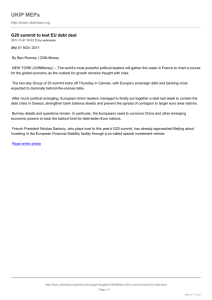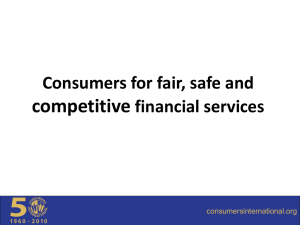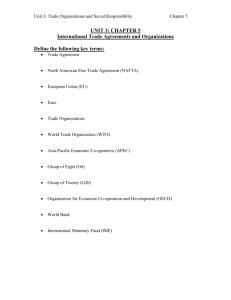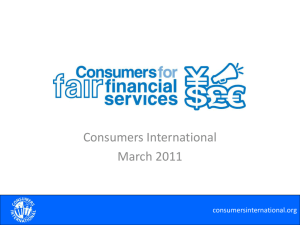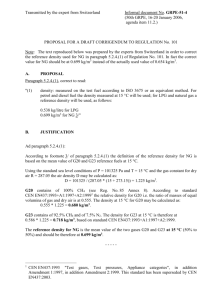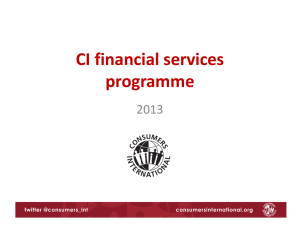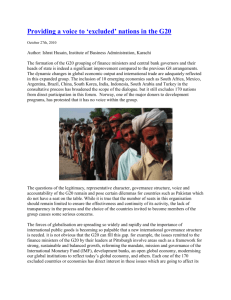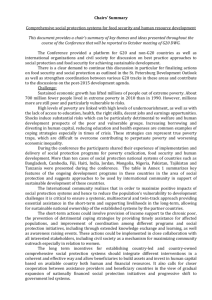The G20: its role and legacy
advertisement
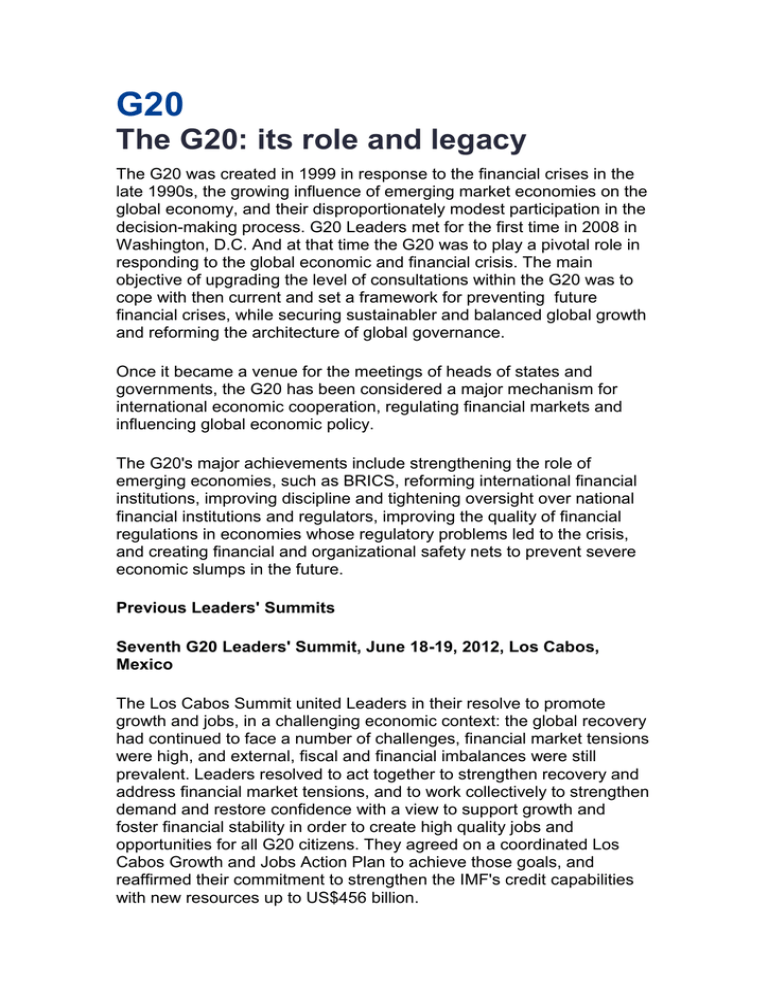
G20 The G20: its role and legacy The G20 was created in 1999 in response to the financial crises in the late 1990s, the growing influence of emerging market economies on the global economy, and their disproportionately modest participation in the decision-making process. G20 Leaders met for the first time in 2008 in Washington, D.C. And at that time the G20 was to play a pivotal role in responding to the global economic and financial crisis. The main objective of upgrading the level of consultations within the G20 was to cope with then current and set a framework for preventing future financial crises, while securing sustainabler and balanced global growth and reforming the architecture of global governance. Once it became a venue for the meetings of heads of states and governments, the G20 has been considered a major mechanism for international economic cooperation, regulating financial markets and influencing global economic policy. The G20's major achievements include strengthening the role of emerging economies, such as BRICS, reforming international financial institutions, improving discipline and tightening oversight over national financial institutions and regulators, improving the quality of financial regulations in economies whose regulatory problems led to the crisis, and creating financial and organizational safety nets to prevent severe economic slumps in the future. Previous Leaders' Summits Seventh G20 Leaders' Summit, June 18-19, 2012, Los Cabos, Mexico The Los Cabos Summit united Leaders in their resolve to promote growth and jobs, in a challenging economic context: the global recovery had continued to face a number of challenges, financial market tensions were high, and external, fiscal and financial imbalances were still prevalent. Leaders resolved to act together to strengthen recovery and address financial market tensions, and to work collectively to strengthen demand and restore confidence with a view to support growth and foster financial stability in order to create high quality jobs and opportunities for all G20 citizens. They agreed on a coordinated Los Cabos Growth and Jobs Action Plan to achieve those goals, and reaffirmed their commitment to strengthen the IMF's credit capabilities with new resources up to US$456 billion. Euro Area members of the G20 agreed to take all necessary policy measures to safeguard the integrity and stability of the area, improve the functioning of financial markets and break the feedback loop between sovereigns and banks. Leaders looked forward to the Euro Area working in partnership with the new Greek government to ensure they remain on the path to reform and sustainability within the Euro Area. Leaders reaffirmed their commitment to implementing their structural and regulatory reform agendas to enhance medium-term growth prospects and build more resilient financial systems, as well as to reducing imbalances by strengthening deficit countries' public finances with sound and sustainable policies that take into account evolving economic conditions and, in countries with large current account surpluses, by strengthening domestic demand and moving toward greater exchange rate flexibility. They agreed that multilateralism is of even greater importance in the current climate, and remained the best asset to resolve the global economy's difficulties. Finally, they committed to intensify their efforts to create a more conducive environment for development, including supporting infrastructure investment, in order to improve living conditions across the globe and protect the most vulnerable. By stabilizing global markets and promoting stronger growth, the G20 would generate significant positive effects on development and poverty reduction across the globe. Sixth G20 Leaders' Summit, November 3-4, 2011, Cannes, France Given the weakening in the global recovery, Leaders agreed on an Action plan for Growth and Jobs to address short term vulnerabilities and strengthen medium-term foundations for growth. In order to strengthen the social dimension of globalization, Leaders decided to set up a G20 task force which would work as a priority on youth employment, and encouraged the ILO to continue promoting ratification and implementation of the eight core Conventions ensuring fundamental principles and rights at work. Leaders also made progress in reforming the international monetary system to make it more representative, stable and resilient, agreeing on actions and principles that would help reap the benefits from financial integration and increase the resilience against volatile capital flows. They welcomed the euro area's comprehensive plan and urged rapid elaboration and implementation, including of country reforms. They committed to ensure that the IMF continued to have resources to play its systemic role to the benefit of its whole membership, and to expeditiously implement in full the 2010 quota and governance reform of the IMF. Leaders agreed on comprehensive measures so that no financial firm could be deemed "too big to fail" and to protect taxpayers from bearing the costs of resolution. They also decided to develop the regulation and oversight of shadow banking and agreed on principles to protect financial services consumers. They agreed to reform the FSB to improve its capacity to coordinate and monitor the G20's financial regulation agenda. Leaders endorsed the IOSCO recommendations to improve regulation and supervision of commodity derivatives markets and decided to invest in and support research and development of agriculture productivity. They launched the "Agricultural Market Information System" (AMIS) to reinforce transparency on agricultural products' markets. To improve food security, they committed to develop appropriate risk-management instruments and humanitarian emergency tolos, and decided that food purchased for non-commercial humanitarian purposes by the World Food Program would not be subject to export restrictions or extraordinary taxes. They also welcomed the creation of a "Rapid Response Forum", to improve the international community's capacity to coordinate policies and develop common responses in time of market crises. Leaders reaffirmed their commitment to rationalize and phase-out over the medium term inefficient fossil fuel subsidies that encourage wasteful consumption, while providing targeted support for the poorest, and called for the implementation of the Cancun agreements and further progress in all areas of negotiation, including the operationalization of the Green Climate Fund, as part of a balanced outcome in Durban. Leaders reaffirmed their standstill commitments until the end of 2013, as agreed in Toronto, committed to roll back any new protectionist measures that may have risen, and agreed to pursue in 2012 fresh, credible approaches to furthering the Doha negotiations. They also supported a strengthening of the WTO, which should play a more active role in improving transparency on trade relations and policies and enhancing the functioning of the dispute settlement mechanism. Recognizing that economic shocks affect disproportionately the most vulnerable, Leaders commited to ensuring a more inclusive and resilient growth, including measures to foster investments in agriculture and mitigate the impact of price volatility, and improving infrastructure in developing countries. Leaders also agreed that new sources of funding needed to be found to address development needs and climate change. Finally, Leaders welcomed the report of UK Prime Minister David Cameron on global governance. Fifth G20 Leaders' Summit, November 11-12, 2010, Seoul, Republic of Korea In the context of uneven growth and widening imbalances, Leaders agreed to develop their common view to meet new challenges and create a path to strong, sustainable and balanced growth beyond the crisis. Leaders agreed on the Seoul Action Plan, which included commitments to - Undertake macroeconomic policies, including fiscal consolidation where necessary, to ensure ongoing recovery and sustainable growth and enhance the stability of financial markets; - Implement a range of structural reforms that boost and sustain global demand, foster job creation, and increase the potential for growth; and - enhance the Mutual Assessment Process (MAP) to promote external sustainability. Leaders also agreed on: - A modernized IMF that better reflected the changes in the world economy through greater representation of dynamic emerging markets and developing countries - Instruments to strengthen global financial safety nets - Core elements of a new financial regulatory framework The Seoul Development Consensus for Shared Growth that sets out the G20 commitment to work in partnership with other developing countries - The Financial Inclusion Action Plan, the Global Partnership for Financial Inclusion and a flexible SME Finance Framework, all of which will significantly contribute to improving access to financial services and expanding opportunities for poor households and small and medium enterprises - Their strong commitment to direct G20 negotiators to engage in across-the-board negotiations to promptly bring the Doha Development Round to a successful, ambitious, comprehensive, and balanced conclusion, and to resist all forms of protectionist measures Leaders also committed to continue the G20's work to prevent and tackle corruption through the Anti-Corruption Action Plan; rationalize and phase-out over the medium term inefficient fossil fuel subsidies; mitigate excessive fossil fuel price volatility; safeguard the global marine environment; and combat the challenges of global climate change. Fourth G20 Leaders' Summit, June 26-27, 2010, Toronto, Canada This was the first Summit of the G20 in its new capacity as the premier forum for international economic cooperation. Building on achievements in addressing the global economic crisis, Leaders agreed on the next steps to take to ensure a full return to growth with quality jobs, to reform and strengthen financial systems, and to create strong, sustainable and balanced global growth. However, Leaders also agreed that serious challenges remained. The recovery was uneven and fragile, unemployment in many countries remained at unacceptable levels, and the social impact of the crisis was still widely felt. Leaders therefore agreed: - To follow through on delivering existing stimulus plans, while working to create the conditions for robust private demand. - To put in place credible, properly phased and growth-friendly plans to deliver fiscal sustainability, differentiated for and tailored to national circumstances. - To make further progress on financial repair and reform to increase the transparency and strengthen the balance sheets of our financial institutions, and support credit availability and rapid growth, including in the real economy. - To build a better regulated and more resilient financial system that serves the needs of G20 citizens. To complete the reforms of the international financial institutions. - To strengthen social safety nets, enhancing corporate governance reform, financial market development, infrastructure spending, and greater exchange rate flexibility in some emerging markets - To renew for a further three years, until the end of 2013, the commitment to refrain from raising barriers or imposing new barriers to investment or trade in goods and services, imposing new export restrictions or implementing World Trade Organization (WTO)-inconsistent measures to stimulate exports. Third G20 Leaders' Summit, September 24-25, 2009, Pittsburgh, USA Leaders reviewed the progress made since the London Summit in April, where national commitments to restore growth resulted in the largest and most coordinated fiscal and monetary stimulus ever undertaken. However, the process of recovery and repair remained incomplete: in many countries, unemployment remained unacceptably high, and the conditions for a recovery of private demand were not yet fully in place. Leaders therefore agreed to: - Launch a framework that sets out the policies and the way G20 countries act together to generate strong, sustainable and balanced global growth - Make sure our regulatory system for banks and other financial firms reins in the excesses that led to the crisis. Where reckless behavior and a lack of responsibility led to crisis, we will not allow a return to banking as usual - Reform the global architecture to meet the needs of the 21st century - Take new steps to increase access to food, fuel and finance among the world's poorest while clamping down on illicit outflows - Phase out and rationalize over the medium term inefficient fossil fuel subsidies while providing targeted support for the poorest - maintain our trade openness and move toward greener, more sustainable growth Second G20 Leaders' Summit, April 2, 2009, London, United Kingdom In the context of the greatest challenge to the world economy in modern times, Leaders pledged to do whatever was necessary to: - Restore confidence, growth, and jobs - Repair the financial system to restore lending - Strengthen financial regulation to rebuild trust - Fund and reform international financial institutions to overcome the crisis and prevent future ones - Promote global trade and investment and reject protectionism, to underpin prosperity - Build an inclusive, green, and sustainable recovery Leaders therefore agreed to: - Treble resources available to the IMF to $750 billion - Support a new SDR allocation of $250 billion - Support at least $100 billion of additional lending by the MDBs - Ensure $250 billion of support for trade finance - Use the additional resources from agreed IMF gold sales for concessional finance for the poorest countries This constituted an additional $1.1 trillion programme of support to restore credit, growth and jobs in the world economy. First G20 Leaders' Summit: November 14-15, 2008, Washington D.C., USA Against a background of deteriorating economic conditions worldwide, Leaders agreed that a broader policy response was needed, based on closer macroeconomic cooperation, to restore growth, avoid negative spillovers and support emerging market economies and developing countries. They therefore agreed to: - Take whatever further actions were necessary to stabilize the financial system - Recognize the importance of monetary policy support, as deemed appropriate to domestic conditions - Use fiscal measures to stimulate domestic demand to rapid effect, as appropriate, while maintaining a policy framework conducive to fiscal sustainability - Help emerging and developing economies gain access to finance in current difficult financial conditions, including through liquidity facilities and program support - Welcome the IMF's new short-term liquidity facility, and urge the ongoing review of its instruments and facilities to ensure flexibility - Encourage the World Bank and other multilateral development banks (MDBs) to use their full capacity in support of their development agenda - Ensure that the IMF, World Bank and other MDBs have sufficient resources to continue playing their role in overcoming the crisis.
